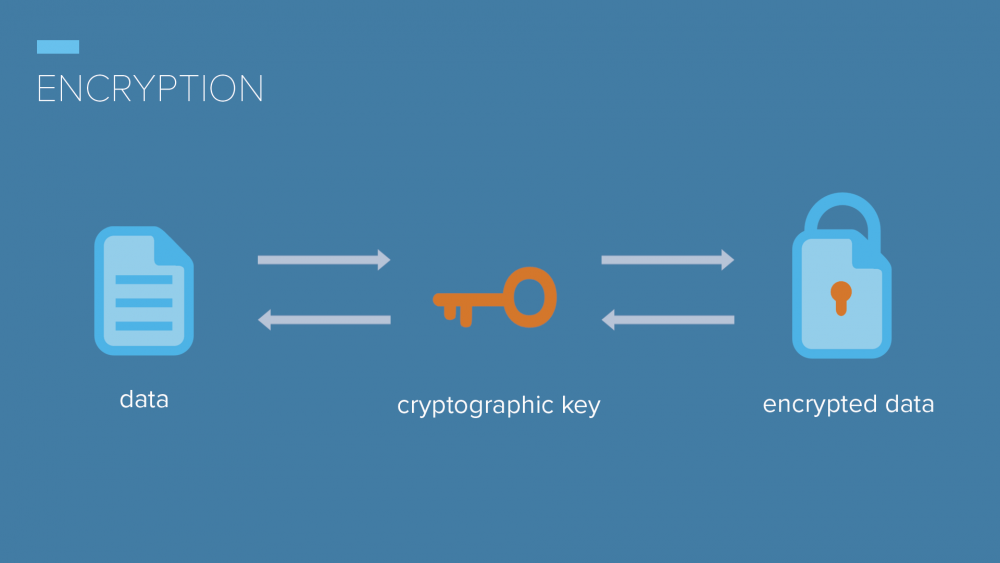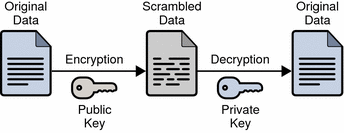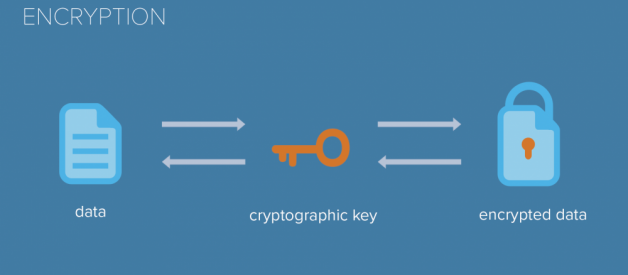Most search engines, regardless of if they track you, encrypt your search data. This is how search engines, including Google, Yahoo and Search Encrypt, all protect their users? information. Google, which collects tons of user data, is obligated to protect that information. SSL encryption is a standard for protecting sensitive information, for search engines and other websites.

Encryption is a process that encodes a message or file so that it can be only be read by certain people. Encryption uses an algorithm to scramble, or encrypt, data and then uses a key for the receiving party to unscramble, or decrypt, the information. The message contained in an encrypted message is referred to as plaintext. In its encrypted, unreadable form it is referred to as ciphertext.
Basic forms of encryption may be as simple as switching letters. As cryptography advanced, cryptographers added more steps, and decryption became more difficult. Wheels and gears would be combined to create complex encryption systems. Computer algorithms have now replaced mechanical encryption.
How Encryption Works
Encryption uses algorithms to scramble your information. It is then transmitted to the receiving party, who is able to decode the message with a key. There are many types of algorithms, which all involve different ways of scrambling and then decrypting information.
How are Encryption Keys Generated?

Keys are usually generated with random number generators, or computer algorithms that mimic random number generators. A more complex way that computers can create keys is by using user mouse movement to create unique seeds. Modern systems that have forward secrecy involve generating a fresh key for every session, to add another layer of security.
Search Encrypt Terms
Key: Random string of bits created specifically for scrambling and unscrambling data. These are used to encrypt and/or decrypt data. Each key is unique and created via algorithm to make sure it is unpredictable. Longer keys are harder to crack. Common key lengths are 128 bits for symmetric key algorithms and 2048 bits for public-key algorithms.
- Private Key (or Symmetric Key): This means that the encryption and decryption keys are the same. The two parties must have the same key before they can achieve secure communication.
- Public Key: This means that the encryption key is published and available for anyone to use. Only the receiving party has access to the decryption key that enables them to read the message.
Cipher: An algorithm used for encryption or decryption. It is a set of steps that are followed as a procedure to encrypt information. There are two main types of ciphers, block ciphers and stream ciphers.
Algorithm: An algorithm is the procedure that the encryption process follows. The specific algorithm is called the cipher, or code. There are many types of encryption algorithms. The encryption?s goal and level of security determines the most effective solution. Triple DES, RSA and Blowfish are some examples of encryption algorithms, or ciphers.
Decryption: The process of switching unreadable cipher text to readable information.
Cryptanalysis: The study of ciphers and cryptosystems to find weaknesses in them that would allow access to the information without knowing the key or algorithm.
Frequency Analysis: A technique used to crack a cipher. Those trying to decrypt a message will study the frequency of letters or groups of letters in a ciphertext. Because some letters occure more often than others, the frequency of letters can reveals parts of the encrypted message. While this method was effective in cracking old encryption methods, it is ineffective against modern encryption.
How Does Search Encrypt Use Data Encryption?

Search Encrypt uses multiple methods of encryption to ensure maximum security. All requests to Search Encrypt are made over SSL (secure socket layer), which is the preferred method for websites that deal with sensitive information like financial information, social security numbers or passwords.
Unlike basic encryption which would use one key, SSL uses a public and a private key together to create a secure connection. Sites like Google, that track user data, use this method to encrypt information about its users.
To protect our users? information even more, we use a short lived key for client side encryption of search history. This means that even if someone accesses your computer, your searches are gone. The short lived key has expired, and then information can?t be decrypted. Search Encrypt uses this expiring key to ensure perfect forward secrecy.
About Search Encrypt ?
Search Encrypt is a privacy-based search engine. It was created and designed with privacy as its number one priority.
Search Encrypt FAQs ?
More About Search Encrypt ? Search Encrypt Blog ?
Thanks for reading. If you learned something new give us some claps! ?


